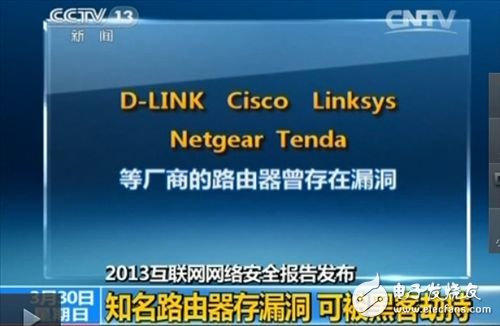After Huawei was exposed to the US National Security Agency (NSA) "network intrusion." Recently, Cisco, Friends, Tenda and other well-known brand routers have been exposed to the back door, there are potential risks. As a result, cyber security issues have once again become the focus of attention.
The National Internet Emergency Center (CNCERT) recently released the "2013 Internet Network Security Report". The report pointed out that last year, the National Information Security Vulnerability Sharing Platform (CNVD) included a total of 7854 security vulnerabilities, including 2607 high-risk vulnerabilities, respectively. The annual growth rate was 15.1% and 6.8%. The number of software and hardware vulnerabilities involving communication network equipment was 505, which was 1.5 times higher than that of 2012. The proportion of the total number of included vulnerabilities increased from 2.9% in 2012 to 6.4%.
The report pointed out that Cisco (Cisco), D-LINK, Tenda, Linksys, Netgear and other manufacturers of router products have backdoors, hackers can directly control the router, further launch DNS hijacking, stealing information, phishing and other attacks, directly threatening users Online transactions and data storage security can lead to corporate and personal information disclosure.
The "router backdoor" is generally the debug interface left by the manufacturer during the development phase. These interfaces have high privileges. If they are discovered and utilized by hackers, they can directly control the user equipment." Qihoo 360 network security expert An Yang Securities Daily said, "The anti-virus software is installed on the PC, and the intrusion of the back door of the router occurs on the router operating system. From a technical point of view, any anti-virus software on the PC cannot judge the access on the router, is the backdoor intrusion or the user's autonomy. access."

Huawei network was invaded by the United States
Recently, the "prism door" protagonist Snowden further broke the news that the NSA has been continuously monitoring the network in China since 2007. Snowden's materials to the media show that the NSA invaded Huawei's servers in Shenzhen headquarters, monitored Huawei's executive communications, and tried to find technical flaws in Huawei products to monitor other countries using Huawei products. It is reported that the action first sneaked into Huawei's main server to obtain information about Huawei routers and other hardware, and the NSA's hacker elite team - "Specific Intrusion Office" directly implanted its back door in Huawei's network, stealing Source code to monitor those networks that use Huawei hardware devices.
Regarding the "intrusion", Huawei responded: "If the report is true, we strongly condemn such invasion, penetration into our internal network and monitoring communications. Although the current digital age is the company's network is constantly It was monitored and attacked from different sources, but we reiterated that Huawei opposes all actions that endanger cybersecurity and is willing to cooperate with governments, industries and users in the most open and transparent manner to jointly address global cybersecurity challenges.
Huawei also said that it will continue to improve and strengthen its infrastructure to protect the security of its customers and its own network.
However, how the NSA succeeded, whether it was achieved through the back door of the router, is still unknown. "According to the information disclosed so far, the outside world cannot judge where the vulnerability is. In addition, Huawei must use its own network equipment instead of some foreign router manufacturers to reserve backdoor products." Anyang said.
But we must face up to the fact that the United States controls most of the world's network resources. PCs, mobile phones, server operating systems, and network-critical nodes are all from the United States.
Routing security matters
For example, Anyang pointed out that the "back door" of D-Link routers is used as an example. As long as the attacker modifies the UA identifier of the browser to a specific identifier, the access router directly obtains the management authority, and arbitrarily views or tampers with the router. Configuration. "D-Link hardware was developed by its subsidiary Alpha Networks of the United States. It can be seen that the back door of some routers was deliberately opened."
In fact, many router vendors actually use the same chip solution, which means that if there is a backdoor at the initial software system level, the risk of compromise will affect multiple products of multiple brands.
In addition to the enterprise market, with the rise of smart homes, since last year, many Internet companies have entered the router field, such as Xiaomi, 360, Shanda, Lenovo and so on. Routers are becoming the backbone of the home Internet and the Internet of Things, but in general, products for home applications are far less secure than enterprise products due to price and cost constraints.
"As router security issues are gradually gaining attention from the industry and the whole society, security will become a decisive factor in the competition in the router market. We believe that the new generation of routers will have a significant improvement in security," Anyang said.
simple celing lamp Simple Beauty, Non-Simple Modeling Design.
modern ceiling lamp is very suitable for Living Room,Dining Room,Study room,Bedroom,Restaurant,Lobby, Bar,Coffe shop and so on.
ceiling lamp,We offer samples with new designs every month to update our showroom and well display in lighting exihibtions.
simple celing lamp,modern ceiling lamp,ceiling lamp
Monike lighting , https://www.monikelight.com